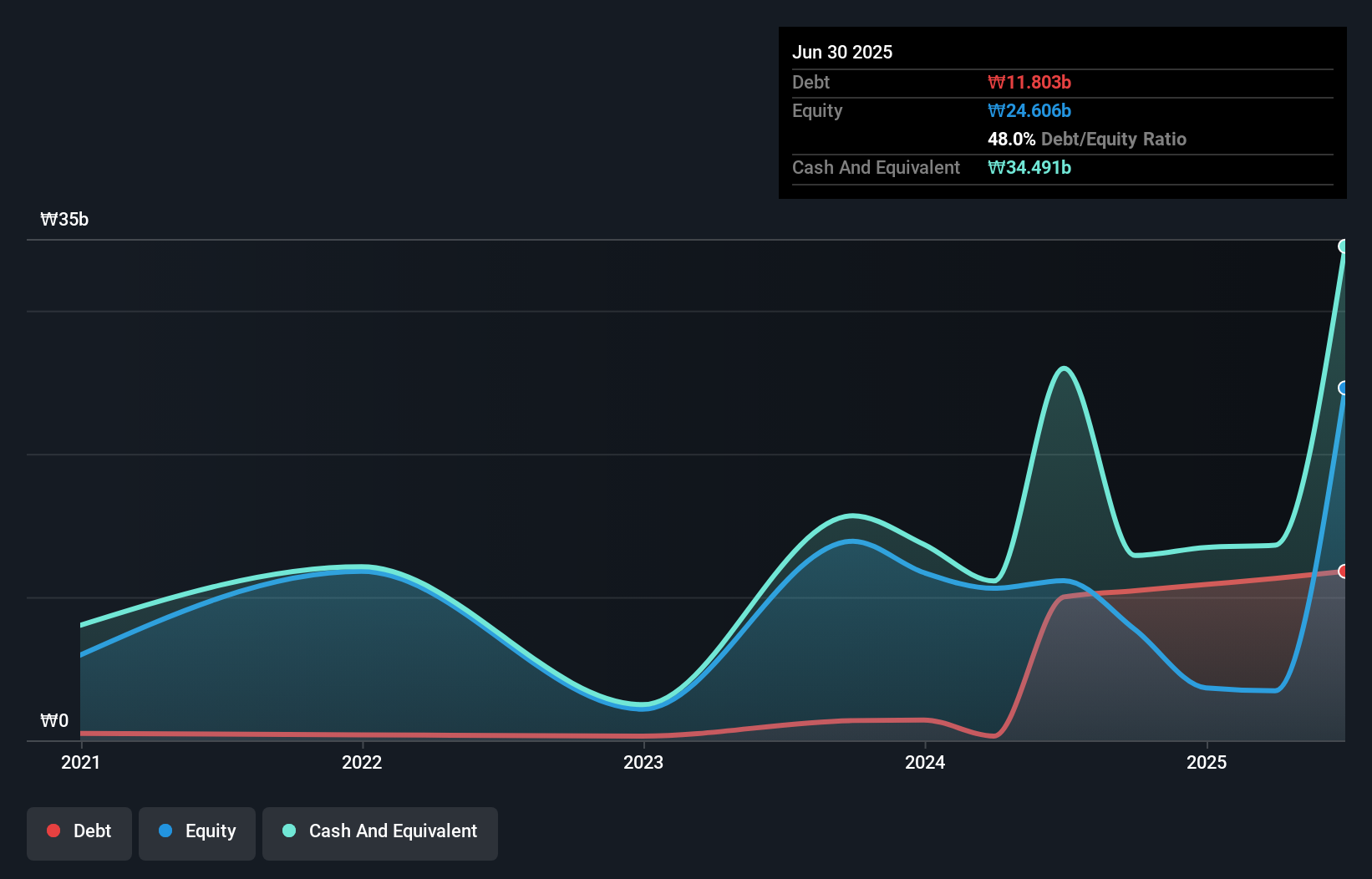Warren Buffett famously said, 'Volatility is far from synonymous with risk.' So it seems the smart money knows that debt - which is usually involved in bankruptcies - is a very important factor, when you assess how risky a company is. As with many other companies Coreline Soft Co., Ltd. (KOSDAQ:384470) makes use of debt. But the real question is whether this debt is making the company risky.
Why Does Debt Bring Risk?
Debt and other liabilities become risky for a business when it cannot easily fulfill those obligations, either with free cash flow or by raising capital at an attractive price. Ultimately, if the company can't fulfill its legal obligations to repay debt, shareholders could walk away with nothing. While that is not too common, we often do see indebted companies permanently diluting shareholders because lenders force them to raise capital at a distressed price. Of course, plenty of companies use debt to fund growth, without any negative consequences. The first thing to do when considering how much debt a business uses is to look at its cash and debt together.
How Much Debt Does Coreline Soft Carry?
You can click the graphic below for the historical numbers, but it shows that as of June 2025 Coreline Soft had ₩11.8b of debt, an increase on ₩10.0b, over one year. But on the other hand it also has ₩34.5b in cash, leading to a ₩22.7b net cash position.

How Healthy Is Coreline Soft's Balance Sheet?
Zooming in on the latest balance sheet data, we can see that Coreline Soft had liabilities of ₩20.3b due within 12 months and liabilities of ₩1.39b due beyond that. Offsetting this, it had ₩34.5b in cash and ₩1.43b in receivables that were due within 12 months. So it can boast ₩14.3b more liquid assets than total liabilities.
This surplus suggests that Coreline Soft is using debt in a way that is appears to be both safe and conservative. Because it has plenty of assets, it is unlikely to have trouble with its lenders. Simply put, the fact that Coreline Soft has more cash than debt is arguably a good indication that it can manage its debt safely. There's no doubt that we learn most about debt from the balance sheet. But you can't view debt in total isolation; since Coreline Soft will need earnings to service that debt. So if you're keen to discover more about its earnings, it might be worth checking out this graph of its long term earnings trend.
Check out our latest analysis for Coreline Soft
In the last year Coreline Soft had a loss before interest and tax, and actually shrunk its revenue by 15%, to ₩3.7b. That's not what we would hope to see.
So How Risky Is Coreline Soft?
Statistically speaking companies that lose money are riskier than those that make money. And we do note that Coreline Soft had an earnings before interest and tax (EBIT) loss, over the last year. And over the same period it saw negative free cash outflow of ₩15b and booked a ₩16b accounting loss. But at least it has ₩22.7b on the balance sheet to spend on growth, near-term. Even though its balance sheet seems sufficiently liquid, debt always makes us a little nervous if a company doesn't produce free cash flow regularly. When analysing debt levels, the balance sheet is the obvious place to start. However, not all investment risk resides within the balance sheet - far from it. To that end, you should learn about the 4 warning signs we've spotted with Coreline Soft (including 2 which are a bit concerning) .
At the end of the day, it's often better to focus on companies that are free from net debt. You can access our special list of such companies (all with a track record of profit growth). It's free.
New: AI Stock Screener & Alerts
Our new AI Stock Screener scans the market every day to uncover opportunities.
• Dividend Powerhouses (3%+ Yield)
• Undervalued Small Caps with Insider Buying
• High growth Tech and AI Companies
Or build your own from over 50 metrics.
Have feedback on this article? Concerned about the content? Get in touch with us directly. Alternatively, email editorial-team (at) simplywallst.com.
This article by Simply Wall St is general in nature. We provide commentary based on historical data and analyst forecasts only using an unbiased methodology and our articles are not intended to be financial advice. It does not constitute a recommendation to buy or sell any stock, and does not take account of your objectives, or your financial situation. We aim to bring you long-term focused analysis driven by fundamental data. Note that our analysis may not factor in the latest price-sensitive company announcements or qualitative material. Simply Wall St has no position in any stocks mentioned.
About KOSDAQ:A384470
Coreline Soft
Coreline Soft, Co., Ltd. develops medical software to provide diagnosis and image solution for lung diseases.
Excellent balance sheet with slight risk.
Market Insights
Community Narratives




